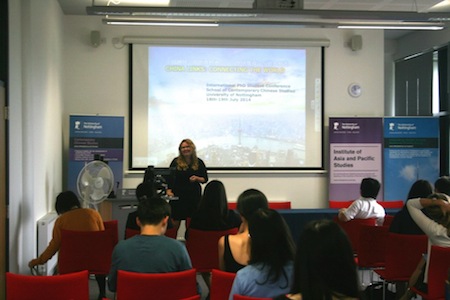Katharine Adeney
Director of the Institute of Asia and Pacific Studies, Nottingham
View this author's profilePosts by Katharine Adeney
China Links: Connecting the World
August 5, 2014
With the generous support of IAPS, IGS and the School of Contemporary Chinese Studies, the international PhD Conference ‘China Links: Connecting the World’ was held in the School of Contemporary Chinese Studies on 18-19 July 2014. The conference sought to promote an interdisciplinary and multidisciplinary dialogue on the various transnational linkages of China throughout its …
An unexpected result? The Indian Election of 2014
June 9, 2014
IAPS will host (made possible by generous support from the Political Studies Association) an event to assess the Indian election of 2014. This will be held on the 3rd July 2014 from 9.30am. Several of the contributors to the #Indiavotes2014 blog, as well as many others, will give their considered analysis of the campaign and …
Law, citizenship and democratic state building in India between 1910-1960s
May 18, 2014
Political Divisions of the Indian Empire Law, citizenship and democratic state building in India between 1910-1960s A one day workshop on 10th April 2014 Organiser: Dr Stephen Legg, School of Geography, University of Nottingham This one day workshop was organized due to a generous grant from the IAPS staff funding scheme. It built upon a …
Director’s thoughts
April 17, 2014
It’s been a great few months with IAPS. We’ve had some fantastic speakers at our seminar series, from issues as diverse as ‘extraordinary rendition’, the ‘developmental state in east Asia’ to ‘nation building in Vietnam’. Thanks to everyone who has taken the time to come and speak, but also to the audience who have asked …
India’s election hots up
March 21, 2014
The #IndiaVotes2014 blog hosted on Ballots and Bullets and associated commentary hots up. IAPS Director, Katharine Adeney posted an article in The Conversation discussing the election campaign. This week the blog has featured analysis of the Modi factor, by Dr James Chiriyankandath from the Institute of Commonwealth Studies, Dr Andrew Wyatt from the Univeristy of …
Indian Election Blog
March 10, 2014
IAPS will be running an Indian Election Blog over the next few weeks, focusing on aspects of the campaign, candidates, state level politics and personalities. This will be run from the Ballots and Bullets Blog and will feature posts from academics working on India in the UK, Europe, America, India and Pakistan. See the first post …
Ethnic autonomy in South Asia: a prelude to secession?
March 5, 2014
Within South Asia in 2014, the states of Nepal and Burma/Myanmar are currently undergoing constitutional redesign and experiencing demands for recognition of territorially concentrated ethnic groups. Similar demands are being made in Pakistan, with demands for Seriaki and Hazara speaking provinces receiving more support in recent years. India is one presidential pen stroke away from creating its …
Losing the Great Game; Russia and China in Central Asian Energy Relations.
February 28, 2014
IAPS was delighted to welcome Davinia Hoggarth, PhD student at the University of Warwick who spoke on the subject of Losing the Great Game; Russia and China in Central Asian Energy Relations. In her extremely stimulating presentation, she argued against the presentation of Kazakhstan as a passive player in the Great Game’, pointing out that …
Tri-campus workshop on Identity and Recognition
February 25, 2014
This event has now been postponed. An update will be posted when more information is available. A tri-campus workshop will be held at the University of Nottingham UK under the auspices of the Institute of Asia and Pacific Studies (IAPS) and the Centre for the Study of Political Ideologies (CSPI). We are inviting paper proposals from …
Ethnic Autonomy in South Asia – a road to secession?
February 17, 2014
As the debate over the Scottish referendum hots up this week, in my inaugural lecture this Thursday 20th Feb I consider the arguments made against granting autonomy to territorially concentrated groups (often termed ‘ethnofederalism’) because of the perceived dangers of increasing pressures for secession. These arguments are prevalent in political discourse and were deployed against …



